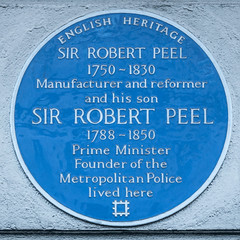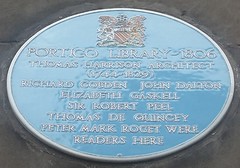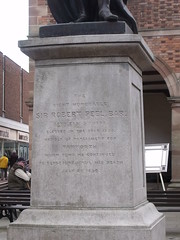Sir Robert Peel 2nd Baronet


Sir Robert Peel 2nd Baronet
(1788-1850)
Member of Parliament (1830-1850), 2nd Baronet Peel of Drayton Manor (from 1830), 28th Prime Minister of the United Kingdom (1834-1835), and 30th Prime Minister of the United Kingdom (1841-1846)
Family tree
founder of Metropolitan Police Service
Commemorated on 3 plaques
Sir Robert Peel 1750-1830 manufacturer and reformer, and his son, Sir Robert Peel 1788-1850 Prime Minister, founder of the Metropolitan Police lived here
16 Upper Grosvenor Street, Westminster, W1, London, United Kingdom where they lived
Portico Library - 1806 Thomas Harrison architect (1744-1829) Richard Cobden John Dalton Elizabeth Gaskell Sir Robert Peel Thomas de Quincey Peter Mark Roget were readers here
Charlotte Street, Manchester, United Kingdom where they read
The right honourable Sir Robert Peel, Bart. Born Feb 5th 1788. Elected in the year 1830. Member of Parliament for Tamworth. Which town he continued to represent until his death July 2nd 1850
Sir Robert Peel statue - outside the Town Hall, Market Street, Tamworth, United Kingdom where they is commemorated (1853)



